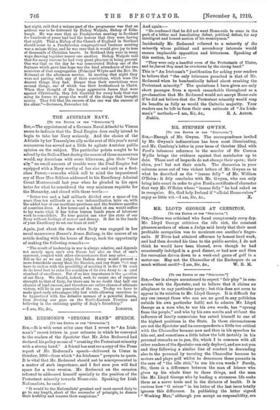THE AUSTRIAN NAVY.
[To ms EDITOR Or THE 'SPECTATOR."] Sin,—The appointment of a German Naval Attache to Vienna seems to indicate that the Dual Empire does really intend to begin to take her Navy seriously. And the choice of the Adriatic by her Transalpine ally as the seat of this year's naval manmuvres has served not a little to agitate Austrian public opinion on the subject. The particular points sought to be solved by the Italian Fleet during the course of those manceuvres would, say Austrians with some bitterness, give their "dear al" no small amount of trouble were the Dual Empire but equipped with a Navy worthy of her size and rank as a first- class Power,—remarks which call to mind the impassioned cry of Herr Max Schloss addressed to his Excellency Admiral Count Montecuccoli last year when he pleaded in his open letter for what he considered the very minimum requisite for the Monarchy, and closed with these words :— " Better two and a half milliards divided over a space of ten years than ten milliards as a war indemnification later on with the added loss of our maritime provinces and the fruitless sacrifice of countless lives. A few hours and a defeat at sea would suffice to lay waste what it has taken human hands years of laborious work to consolidate. No true patriot can view the state of our Navy without feelings of sorrow and dismay. It lies in the hands of your Excellency to set our fears at rest.'
Again, just about the time when Italy was engaged in her naval manceuvres Danzer's Armee Zeitung, in the course of an article dealing with the house of Savoy, took the opportunity of making the following remarks :—
" The result of leadership in war is always relative, and depends not merely upon one's own fitness but also on that of one's opponent, coupled with other circumstances that may arise But as far as we can judge, the Italian Army would present a more formidable enemy than the Russian, and any State Piet may have to reckon with the possibility of meeting it in the file must do its level best th raise the condition of its own Army to n gag standard of excellence. But of no less importance is the question of our Navy. We should, indeed, seek to create ono of superior strength to that of Italy, for there can be no doubt that half our chances of land success, and therefore our entire chance of ultimate victory, will lie in our possession of the sea. To-day we have to make good early advantages idly lost while allowing ourselves to be hypnotised with the delusive menace of a powerful Russia, then riveting our gaze on the North-Eastern Frontier and believing in the enduring quality of Italy's friendship."


































































 Previous page
Previous page